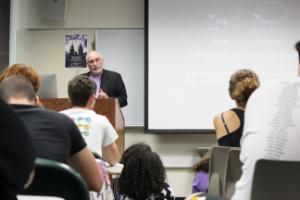Dr. Jonathan Marks Spoke to Students at the University of Miami College of Arts & Sciences
When NASA launched unmanned space probe Pioneer 10 on a voyage outside of the solar system in 1972, the vessel contained a drawing of a man and a woman – both young, physically fit, and completely naked. The idea was to provide an accurate depiction of the ship’s senders, humans, in the event that Pioneer 10 was intercepted by aliens.
Anthropologist Jonathan Marks often shares the story of the so-called “Pioneer plaque” to make a point about the importance of culture to human development.
He notes that in attempting to convey an image of humans stripped of culture (namely, clothing), the astronauts actually conveyed significant cultural information. From the figures’ postures to their hairstyles, the drawing proves that culture is an integral part of human nature.
 Marks, a professor of anthropology at the University of North Carolina, Charlotte, who is serving as a Templeton Fellow at the Notre Dame Institute for Advanced Study this semester, specializes in the study of human evolution and diversity.
Marks, a professor of anthropology at the University of North Carolina, Charlotte, who is serving as a Templeton Fellow at the Notre Dame Institute for Advanced Study this semester, specializes in the study of human evolution and diversity.
Anthropology students and others interested in evolution and genetics packed the room when Marks spoke at the UM College of Arts & Sciences (A&S) last week; his lecture was co-sponsored by the Department of Anthropology and the Center for the Humanities.
He said, “It is unscientific to imagine human evolution as simply a succession of biological processes and effects. Without confronting the cultural aspects of human evolution, one cannot approximate the reality of human origins or human nature.”
Marks noted three “invisible aspects” of human evolution:
- Society. Familial relationships that are not found in other species, such as father-child bonds and connections among multiple generations (children and grandparents) illustrate this point.
- Morality. Humans are the only species with established taboos, especially incest and cannibalism.
- Imagination. Marks said, “People cry about things that are not real,” referring to movies and other fictional creations.
Pamela Geller, assistant professor of anthropology in the UM College of Arts & Sciences, said, “Dr. Marks like to tackle those big questions about who we are as humans, but he does not make presumptions or offer unsubstantiated statements about human nature. Rather, he presents a consideration of the intimate relationship between biology and culture. And he has the rare ability to communicate complex ideas – about genetics, anatomy, evolution – in a way that is informative, accessible, and humorous.”
Marks also spoke to students in Geller’s “Race Matters” course while at UM.
Marks received his PhD from the University of Arizona. He is the author of The Alternative Introduction to Biological Anthropology (2011), Why I Am Not a Scientist (2009), and What It Means to Be 98% Chimpanzee (2002).

